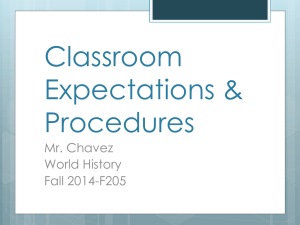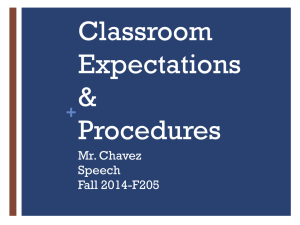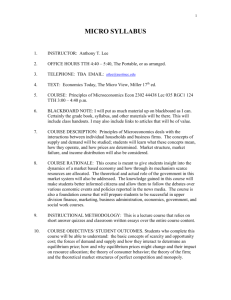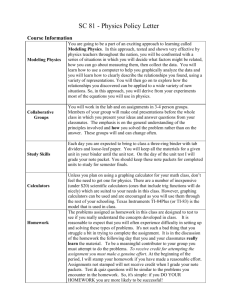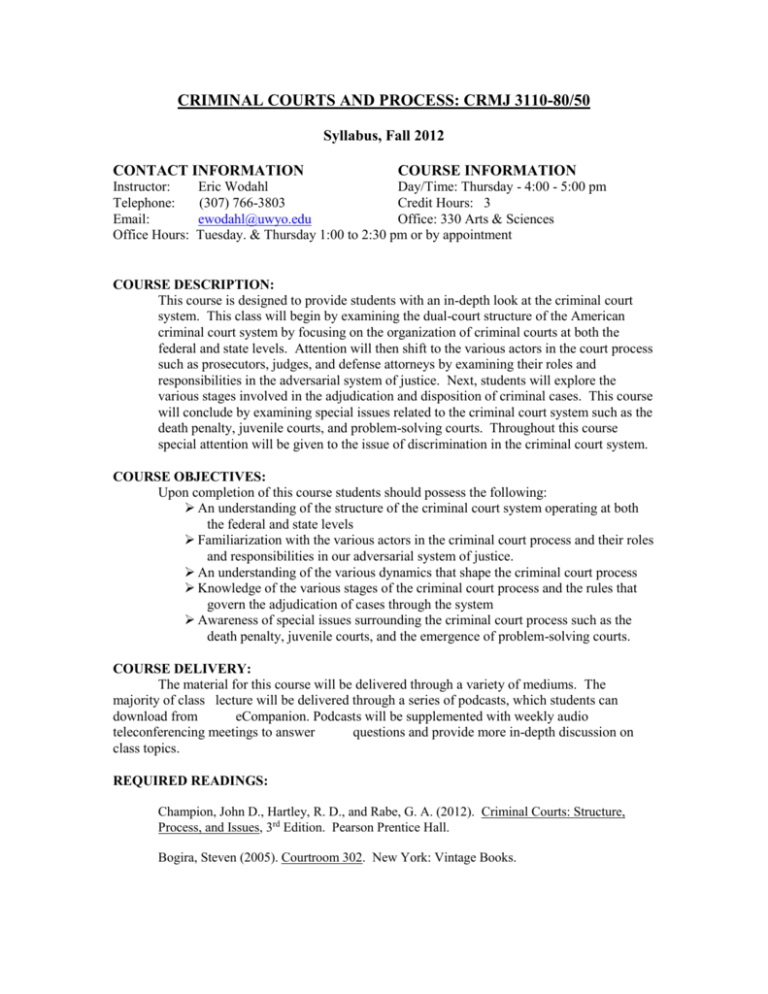
CRIMINAL COURTS AND PROCESS: CRMJ 3110-80/50
Syllabus, Fall 2012
CONTACT INFORMATION
Instructor:
Telephone:
Email:
Office Hours:
COURSE INFORMATION
Eric Wodahl
Day/Time: Thursday - 4:00 - 5:00 pm
(307) 766-3803
Credit Hours: 3
ewodahl@uwyo.edu
Office: 330 Arts & Sciences
Tuesday. & Thursday 1:00 to 2:30 pm or by appointment
COURSE DESCRIPTION:
This course is designed to provide students with an in-depth look at the criminal court
system. This class will begin by examining the dual-court structure of the American
criminal court system by focusing on the organization of criminal courts at both the
federal and state levels. Attention will then shift to the various actors in the court process
such as prosecutors, judges, and defense attorneys by examining their roles and
responsibilities in the adversarial system of justice. Next, students will explore the
various stages involved in the adjudication and disposition of criminal cases. This course
will conclude by examining special issues related to the criminal court system such as the
death penalty, juvenile courts, and problem-solving courts. Throughout this course
special attention will be given to the issue of discrimination in the criminal court system.
COURSE OBJECTIVES:
Upon completion of this course students should possess the following:
An understanding of the structure of the criminal court system operating at both
the federal and state levels
Familiarization with the various actors in the criminal court process and their roles
and responsibilities in our adversarial system of justice.
An understanding of the various dynamics that shape the criminal court process
Knowledge of the various stages of the criminal court process and the rules that
govern the adjudication of cases through the system
Awareness of special issues surrounding the criminal court process such as the
death penalty, juvenile courts, and the emergence of problem-solving courts.
COURSE DELIVERY:
The material for this course will be delivered through a variety of mediums. The
majority of class lecture will be delivered through a series of podcasts, which students can
download from
eCompanion. Podcasts will be supplemented with weekly audio
teleconferencing meetings to answer
questions and provide more in-depth discussion on
class topics.
REQUIRED READINGS:
Champion, John D., Hartley, R. D., and Rabe, G. A. (2012). Criminal Courts: Structure,
Process, and Issues, 3rd Edition. Pearson Prentice Hall.
Bogira, Steven (2005). Courtroom 302. New York: Vintage Books.
Walker, S. (2001). Sense and nonsense about crime and drugs (Chapter 2: Models of the
Criminal Court Process). Belmont, CA: Wadsworth. Available on eCompanion
Rottman, David, and Casey, P. (1999). Therapeutic Jurisprudence and the Emergence of
Problem-Solving Courts. National Institute of Justice. Available on eCompanion
COURSE REQUIREMENTS:
A. Weekly On-Line Quizzes – Each week students will be required to complete an online quiz focusing on the assigned podcasts and readings for that week. Quizzes can
be accessed through eCompanion by clicking on the corresponding unit tab on the
left hand of the screen. Quizzes will be posted each week (no later than 5:00 pm on
Friday) and must be completed by 3:00 pm the following Thursday. Students will
have 20 minutes to complete the quiz. Quizzes are considered open-book, meaning
that notes and readings can be used. However, quizzes must be completed
individually, and students are not allowed to consult with other class members about
the quizzes. Anyone found to be collaborating or assisting other students with
quizzes will be subject to the penalties outlined in the Academic Dishonesty section
of this syllabus. Quizzes will be a combination of multiple choice, true/false,
matching, and short answer questions. Each quiz will be worth 10 points. Each
student’s lowest quiz score will be dropped from his/her grade at the end of the
semester.
B. Take Home Essay Quizzes - There will be a total of 3 take home essay quizzes
throughout the course of the semester. Each quiz will be worth 30 points. The
questions for the quizzes will be made available on eCompanion at least one week
before they are due. Quizzes must be turned in on eCompanion unless previous
arrangements have been made with the instructor. Quizzes are due at 11:59 pm on
the dates listed below:
Quiz 1
Quiz 2
Quiz 3
October 4th
November 1st
December 13th
C. Courtroom 302 Online Exam - You will be required to complete an online exam
over your assigned reading Courtroom 302. You can access the exam through
eCompanion beginning October 8th at 10:00 am and must be completed by October
11th at 4:00 pm. The quiz is worth 30 points.
D. Courtroom 302 Connection Papers – Each student is required to complete two
Courtroom 302 Connection Papers throughout the course of the semester. These
papers will require you to apply important concepts from class to the book
Courtroom 302. Each paper is expected to be two (2) to five (5) pages in length, and
students will be graded on both the content and quality of their written work. More
detailed instructions on this assignment will be provided at a later date. Each paper is
worth a maximum of 30 points. Papers are due at 11:59 pm on the dates listed
below:
Connection Paper #1
October 25th
Connection Paper #2
November 29th
E. Class Participation - Students are expected to have read assigned readings prior to
class and be prepared to participate in class discussions and activities. Class
participation points will be determined by a variety of factors including attendance,
frequency of participation in class discussion and activities, and quality of
participation in class discussion and activities. Class participation is worth 30
points.
GRADING SCALE:
Weekly On-Line Quizzes
Take Home Essay Quizzes
Courtroom 302 Online Exam
Courtroom 302 Connection Papers
Class Participation
Total
Grade:
A
B
C
D
F
Percentage:
90-100%
80-89%
70-79%
60-69%
less than 60%
120 points
90 points
30 points
60 points
30 points
330 points
Class Points:
296-330
263-295
230-262
197-229
000-196
ACADEMIC DISHONESTY:
Academic dishonesty in all its forms will not be tolerated in this class. This includes
cheating on tests, turning in someone else’s work as your own, plagiarism, or assisting
other students in these activities. Students are expected to do their own work, and anyone
caught engaging in academic dishonesty will be dealt with in accordance with University
Regulation 802. Students found to have committed academic dishonesty will receive a
failing grade on the assignment and may receive a failing grade in the class depending on
the severity of the transgression. Each student is encouraged to read University
Regulation 802 for further information concerning academic dishonesty and the potential
consequences.
ATTENDANCE:
Attendance is important to the successful completion of this course. Students are
expected to be prepared to participate in class discussions by having completed all
assigned readings and viewed all required podcasts prior to class. Students are also
expected to check eCompanion on a regular basis for information pertaining to this
course.
STUDENTS WITH DISABILITIES:
It is University of Wyoming policy to accommodate students, faculty, staff, and visitors
with disabilities. If you have a physical, learning, sensory, or psychological disability and
require accommodations, please let me know as soon as possible. You will need to
register with University Disability Support Services (UDSS) in the Student Educational
Opportunity offices, Room 330 Knight Hall, and provide UDSS with documentation of
your disability.
COURSE OUTLINE
Part I: The Structure of American Courts
August 30:
Introduction/Review syllabus and other course requirements
September 6:
Chapter 1 - Law: The Legal Battlefield
Part II: Actors in the Criminal Court System
September 13:
September 20:
Chapter 2 - The Structure of American Courts
The Dynamics of the Criminal Court Process (Read chapter 3, pgs. 71-73) &
Walker, S. (2001). Models of the Criminal Court Process (Available on
eCompanion)
September 27:
Chapter 3 - The Prosecution.
October 4:
Chapter 4 - The Defense -Take Home Essay Quiz #1 due
October 11:
Chapter 5 – Judges – Courtroom 302 On-Line Quiz Due
October 18:
Defendants and Victims and the Criminal Court Process
Part III: Stages of the Criminal Court Process
October 25:
November 1:
Chapter 7 - Pretrial Procedures and the Trial Process – only pages 143-156
1st Courtroom 302 Connection Paper due
Chapter 8 - Pretrial Procedures: Plea Bargaining/Front-Line Video on Plea
Bargaining. Take Home Essay Quiz #2 due
November 8:
.
Chapter 7 - Pretrial Procedures and the Trial Process – pages 156-180 &
Chapter 6 –Juries
November 15:
Chapter 9 - Sentencing Goals and Structures &
Chapter 10 – Judicial Sentencing Options, Sentencing Disparities, and Appeals
November 22:
No Class Thanksgiving Break
Part IV: Special Issues
November 29:
December 6:
December 13:
Chapters 11 & 12 – The Juvenile Justice System: Juvenile Rights and Case
Processing & Juvenile Courts: Adjudication and Disposition/2nd Courtroom
302 Connection Paper due
The Death Penalty and Problem Solving Courts
Therapeutic Jurisprudence and the Emergence of Problem-Solving Courts
Take Home Essay Quiz #3 due
*Note: This is a tentative class schedule which may be adjusted due to unforeseen
circumstances. The instructor will notify students at least one week in advance of any changes to the
test schedule.




